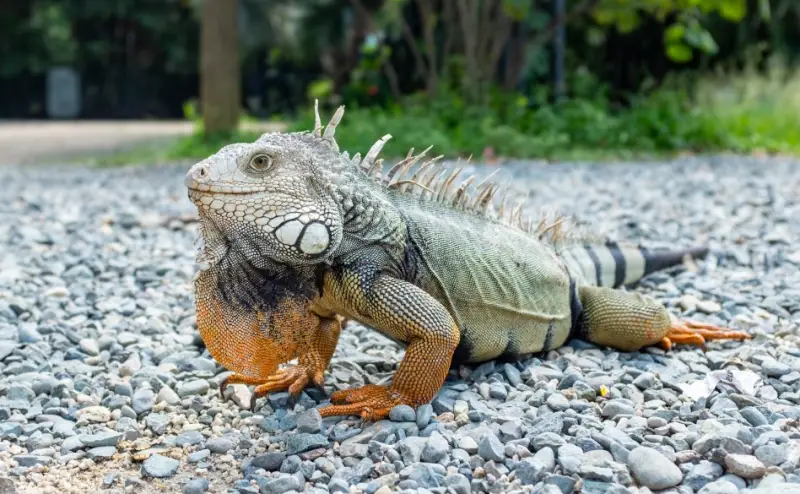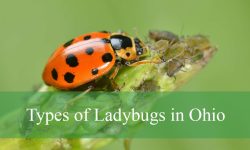Iguanas are fascinating reptiles known for their vibrant colors and unique personalities. However, to keep them healthy and happy, it’s crucial to understand their dietary needs.
In this comprehensive guide, we’ll explore what iguanas eat and how to provide the perfect diet for your pet iguana.
Understanding Iguana Nutrition

Why Is Diet Important for Iguanas?
Iguanas are herbivorous reptiles, which means they primarily eat plant-based foods. Their digestive systems are specially adapted to process fibrous vegetation, allowing them to extract essential nutrients for growth, energy, and overall health. A well-balanced diet is crucial because it supports:
- Growth and Bone Health: Young iguanas grow rapidly and need high levels of calcium and vitamin D3 to develop strong bones. Without proper nutrition, they are at risk of metabolic bone disease (MBD), which leads to weak bones, deformities, and fractures.
- Immune System Function: Vitamins A, C, and K—found in leafy greens and vegetables—boost the immune system, helping iguanas fight infections and maintain overall health.
- Energy and Vitality: Iguanas are active reptiles. A diet rich in complex carbohydrates provides the energy needed for movement, climbing, and daily activities.
- Digestive Health: High-fiber foods aid digestion and maintain healthy gut flora, preventing constipation and digestive issues.
An improper diet can lead to serious health problems, including metabolic bone disease, obesity, digestive issues, and even kidney failure. Therefore, understanding their nutritional needs is essential for keeping your iguana healthy and active.
Natural Diet of Iguanas in the Wild
In the wild, iguanas consume a variety of plant-based foods, including leafy greens, flowers, fruits, and occasionally small insects. They are folivores, meaning their diet mainly consists of leaves. Wild iguanas are known to eat:
- Leaves and Flowers: From trees, shrubs, and vines, which provide fiber, vitamins, and minerals.
- Fruits: Eaten sparingly due to high sugar content, fruits provide natural energy and hydration.
- Occasional Insects: While not a primary food source, wild iguanas may accidentally consume small insects while eating plants. However, their digestive systems are not designed to process animal protein.
Mimicking this natural diet in captivity is crucial for maintaining their health. This means providing a variety of leafy greens, vegetables, and limited fruits while avoiding animal protein and harmful foods.
What Do Iguanas Eat?
Leafy Greens – The Staple of an Iguana’s Diet
Leafy greens should make up around 70-80% of an iguana’s diet because they are rich in essential vitamins and minerals. Some of the best options include collard greens, which are high in calcium and low in phosphorus, making them ideal for bone health. Mustard greens are packed with vitamins A, C, and K, supporting the immune system and overall well-being. Dandelion greens are an excellent source of calcium and other vitamins, while turnip greens are both nutritious and readily available. However, spinach and kale should be avoided in large quantities as they contain oxalates that can bind calcium, leading to deficiencies.
Vegetables – Adding Variety and Nutrients
About 20% of an iguana’s diet should consist of vegetables, which provide additional nutrients and variety, supporting balanced nutrition. Squash varieties such as butternut, acorn, and spaghetti squash are high in fiber and vitamins, promoting healthy digestion. Bell peppers are an excellent source of vitamin C, while green beans offer a good balance of protein and fiber. Carrots, high in beta-carotene, help maintain eye health. Including a variety of vegetables ensures a well-rounded intake of nutrients.
Fruits – Occasional Treats
Fruits should be given as occasional treats, making up around 10% or less of the iguana’s diet because they are high in sugar. Suitable fruits include papaya, which contains digestive enzymes that aid in digestion, and mango, rich in vitamin A, supporting vision and immune health. Berries like blueberries and strawberries are packed with antioxidants, promoting overall health. Bananas can also be given but in moderation due to their high sugar content. It is important to avoid citrus fruits such as oranges, as they are too acidic and can cause digestive issues in iguanas.
Foods to Avoid for Iguanas
Toxic and Harmful Foods
Not all fruits and vegetables are safe for iguanas. Some foods can be toxic or cause serious health issues. Spinach and kale, although nutritious, are high in oxalates, which bind calcium and hinder its absorption, potentially leading to calcium deficiencies and metabolic bone disease. Avocado is extremely dangerous for iguanas as it contains persin, a compound that is toxic to them and can cause digestive issues or even death. Rhubarb should also be avoided because of its high oxalic acid levels, which are highly toxic to iguanas. Additionally, insects and animal protein are harmful because iguanas are strict herbivores. Their digestive systems are not designed to process animal protein, which can lead to kidney damage and other serious health complications.
Processed and Human Foods
Iguanas should never be fed processed or human foods. Dairy products are particularly harmful since iguanas cannot digest lactose, leading to digestive discomfort and potential health issues. Bread and grains are also unsuitable because they lack essential nutrients and can cause digestive blockages. Sugary or salty foods are harmful to an iguana’s digestive system and can disrupt their overall health. To ensure your iguana stays healthy, it is crucial to stick to a diet of leafy greens, vegetables, and occasional fruits, avoiding all toxic, processed, and human foods.
How to Prepare and Serve Food
Proper Cutting and Presentation
When preparing food for your iguana, it is important to chop it into bite-sized pieces. This helps prevent choking and makes digestion easier. Mixing a variety of leafy greens and vegetables ensures a balanced meal, providing essential nutrients and keeping your iguana interested in its food. Offering a colorful mix of greens and vegetables not only makes the food more appealing but also ensures a broad spectrum of vitamins and minerals.
Feeding Schedule and Portions
Feeding schedules and portion sizes depend on the age and size of the iguana. Young iguanas, up to 3 years old, require daily feeding to support their rapid growth and high energy needs. Adult iguanas can be fed every other day or daily in smaller portions, depending on their activity level and health. The portion size should generally be about the size of the iguana’s head, ensuring they receive enough food without overeating. Monitoring your iguana’s weight and activity levels helps in adjusting the feeding schedule and portion sizes as needed.
Hydration and Water Requirements
Iguanas need constant access to fresh water. Provide a shallow water dish that is easy to clean and refill daily. This not only ensures proper hydration but also helps maintain a clean environment. Additionally, misting the enclosure regularly helps maintain the necessary humidity levels while allowing the iguana to drink water droplets from leaves and surfaces. Proper hydration is essential for digestion, kidney function, and overall health.
Supplements for Iguanas
Calcium and Vitamin D3
Iguanas require calcium supplements to support bone health and prevent metabolic bone disease. Calcium is crucial for maintaining strong bones and muscle function, especially in young, growing iguanas. Using calcium powder to dust their food 2-3 times a week is an effective way to ensure they receive enough of this essential mineral. In addition to calcium, iguanas need vitamin D3 to absorb calcium properly. However, vitamin D3 supplements should be used sparingly to avoid toxicity, especially if your iguana is exposed to natural sunlight or high-quality UVB lighting, which helps them naturally produce vitamin D3.
Multivitamins
To ensure a balanced nutrient intake, it is recommended to provide a reptile-safe multivitamin once a week. This helps fill any nutritional gaps and supports overall health, including immune function, vision, and skin health. Be cautious not to over-supplement, as excessive vitamins can cause health issues. A well-balanced diet combined with appropriate supplements will keep your iguana healthy and thriving.
Common Feeding Mistakes to Avoid
Feeding iguanas requires careful planning to ensure they receive a balanced diet without any harmful effects. One common mistake is feeding too much fruit. Although fruits are nutritious, they are also high in sugar, which can lead to obesity and digestive issues if given too frequently. It is best to limit fruit intake to about 10% or less of their overall diet.
Another common error is a lack of calcium. Iguanas need calcium to maintain strong bones and prevent metabolic bone disease. Without adequate calcium or a proper calcium-to-phosphorus ratio, they can develop weak bones, deformities, and other serious health problems. Using calcium supplements and offering calcium-rich leafy greens like collard greens and dandelion greens can help prevent these issues.
Incorrect food sizes are also a concern. Large pieces of food can cause choking or digestive blockages. Always chop food into bite-sized pieces to make it easier for your iguana to eat and digest.
Improper use of supplements is another mistake to avoid. While supplements are essential for a balanced diet, over-supplementation can be harmful. Too much vitamin D3, for example, can lead to toxicity and organ damage. It is important to follow recommended guidelines for supplement usage and adjust them based on your iguana’s age, size, and health condition.
Frequently Asked Questions
Can Iguanas Eat Flowers?
Yes! Certain flowers are safe and nutritious for iguanas, including:
- Hibiscus – High in vitamin C.
- Rose petals – Ensure they are pesticide-free.
- Dandelions – Nutrient-rich and safe to eat.
Do Iguanas Need UVB Light for Proper Digestion?
Yes, UVB light is crucial for iguanas to synthesize vitamin D3, which aids in calcium absorption. Without UVB exposure, iguanas are at risk of developing metabolic bone disease.
Can Iguanas Eat Commercial Pellets?
Commercial iguana pellets can be fed occasionally but should not replace fresh greens and vegetables. Ensure they are high-quality and formulated specifically for herbivorous reptiles.
Creating the Perfect Diet Plan for Your Pet Iguana
Sample Weekly Diet Plan
Monday, Wednesday, Friday:
- Leafy Greens: Collard greens, mustard greens, and dandelion greens.
- Vegetables: Bell peppers, squash, and carrots.
- Fruits (once a week): Papaya or berries as a treat.
Tuesday, Thursday, Saturday:
- Leafy Greens: Turnip greens, escarole, and endive.
- Vegetables: Green beans and butternut squash.
- Calcium Supplement – Lightly dust food.
Sunday:
- Leafy Greens Mix – Variety of the week’s greens.
- Multivitamin Supplement – Once a week.
Monitoring Health and Adjusting Diet
Regularly monitoring your iguana’s health is essential for ensuring they receive the proper nutrition. Observe their energy levels, growth patterns, and stool consistency to assess how well they are responding to their diet. A healthy iguana should be active, alert, and exhibit steady growth, especially when young. Their stool should be well-formed, not too watery or overly dry, which indicates proper digestion and hydration.
If you notice changes in energy levels, weight loss, or abnormal stool consistency, it may be necessary to adjust their diet. For example, if your iguana seems lethargic or is losing weight, you may need to increase portion sizes or include more nutrient-dense greens. Conversely, if they are gaining too much weight, reducing sugary fruits and overall portion sizes can help maintain a healthy weight. Adjusting food types and portions as needed is key to supporting your iguana’s overall health and well-being.
Conclusion
Providing the perfect diet for your pet iguana requires a balance of leafy greens, vegetables, occasional fruits, and proper supplementation. By understanding what iguanas eat and avoiding common feeding mistakes, you can ensure a healthy and happy life for your scaly companion.
For more tips on iguana care and nutrition, continue exploring our website and stay informed about the latest reptile care practices.






